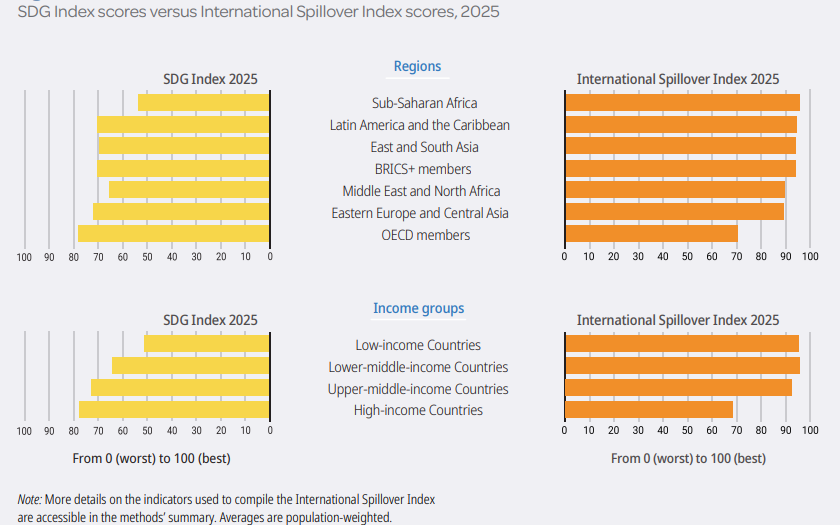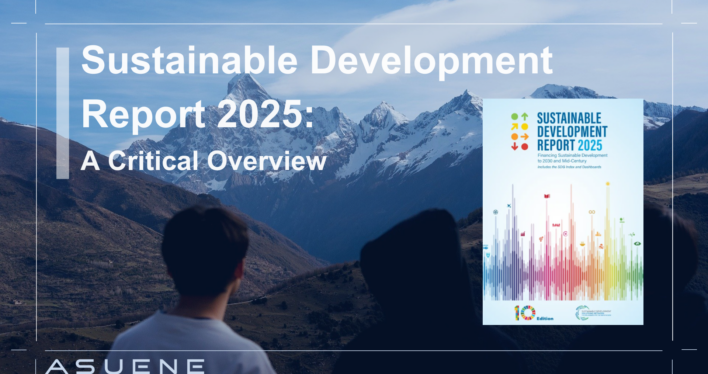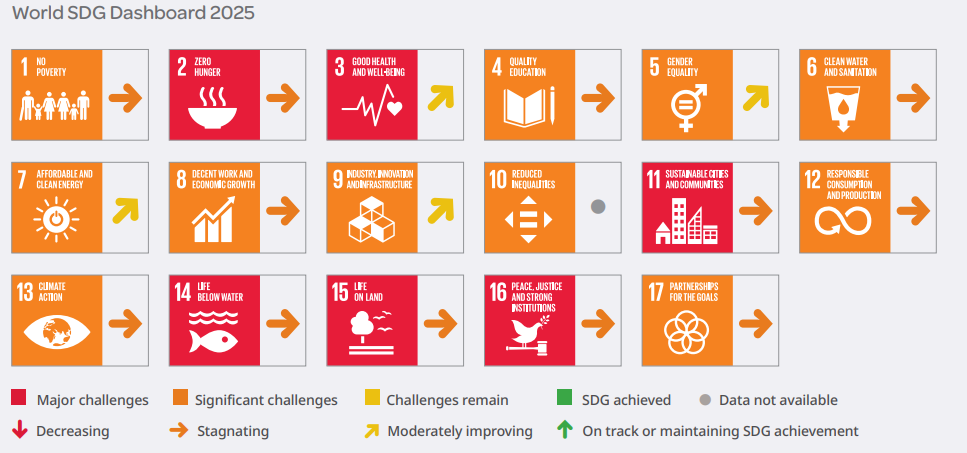- Article Summary
-
Global Progress: An Urgent Call to Action
The Sustainable Development Report 2025 highlights a concerning reality: globally, we remain off track in achieving the Sustainable Development Goals (SDGs) by the 2030 target date. Progress has been uneven and insufficient, emphasizing an urgent need for accelerated and coordinated action. A key concern highlighted in the report is the inadequacy of the global financial architecture, which hampers efficient funding and resource allocation needed to achieve SDGs.
Why Are We Falling Short?
While the global community acknowledges the importance of achieving the SDGs, multiple interconnected challenges have significantly slowed our progress. The report identifies systemic issues, policy misalignments, insufficient global cooperation, and significant shortcomings within the global financial architecture as key drivers behind this stagnation.
Several critical factors have significantly impeded global progress:
- Goal 13 (Climate Action): Global emissions continue rising, driven by insufficient mitigation efforts and lack of decisive policy actions, particularly in major emitters like the US, China, and India.
- Goal 10 (Reduced Inequalities): Increasing inequality due to economic disruptions from global crises, compounded by geopolitical conflicts and international trade tensions.
- Goal 2 (Zero Hunger): Persistent food insecurity exacerbated by conflicts, economic downturns, and climate-induced disruptions, notably in regions such as sub-Saharan Africa and South Asia.
- Global Financial Architecture: A significant barrier is the limited fiscal space available to developing countries, severely restricting their capacity to invest adequately in sustainable development. Approximately half of the world’s population resides in nations unable to access affordable, long-term capital due to excessive debt burdens and insufficient international financing mechanisms.
Addressing these challenges requires urgent intervention, improved international collaboration, and a robust reform of financial mechanisms capable of responding rapidly and equitably to developmental needs.improved international collaboration, and robust financial mechanisms capable of responding rapidly to crises and ongoing developmental needs.
International Spillovers: A Barrier to Global Progress
International spillovers, including environmental, economic, and social impacts resulting from actions taken by individual countries, significantly influence global progress towards achieving the SDGs. Countries, particularly developed nations, often export negative impacts through unsustainable consumption, waste exports, and unfair tax practices. These spillovers undermine the capacity of other nations, especially developing countries, to achieve their sustainable development targets. The report calls for enhanced accountability, greater transparency in international transactions, and comprehensive global regulatory frameworks to mitigate these adverse effects and promote fairer, more sustainable global interactions.

Positive Signs Amidst Global Challenges
Despite setbacks, noteworthy progress has been recorded in specific areas, demonstrating the potential for success when concerted efforts and effective policies are implemented. These encouraging developments illustrate pathways that other sectors and regions can adopt to accelerate SDG achievements.
Notable progress includes:
- Goal 7 (Affordable and Clean Energy): Remarkable investment growth in renewable energy, especially wind and solar in Europe, driven by strong policy frameworks and private-sector engagement.
- Goal 11 (Sustainable Cities and Communities): Significant urban sustainability advancements seen in innovative city projects such as those in Amsterdam, Copenhagen, and New York.
- Goal 12 (Responsible Consumption and Production): Increasing corporate integration of sustainable practices, particularly among leading businesses in the US and Europe, reflected in enhanced transparency and sustainability reporting.
The report underscores sustainable development as offering high returns, particularly in emerging and developing economies (EMDEs). Reforming the Global Financial Architecture (GFA) to direct more favorable and substantial capital flows towards these regions, with their higher growth potential, is essential. Upcoming international gatherings such as the 4th International Conference on Financing for Development (FfD4) in Seville represent pivotal opportunities to enact these crucial reforms. positive change globally.

Essential Actions for Businesses and Stakeholders
To reverse negative trends and accelerate sustainable development, decisive action is necessary across all sectors. Businesses must deepen commitments to sustainability, integrating these principles fully into core strategies, increasing transparency, and significantly expanding investment in sustainable technologies. Policymakers should urgently reform the global financial architecture, implementing clear and incentivizing regulatory frameworks to enhance efficiency and equity in funding for sustainability initiatives. Enhanced international collaboration on policy alignment and financial support is critical. Civil society and the international community play pivotal roles by fostering accountability through robust tracking, transparent reporting mechanisms, and advocating for sustained global awareness and commitment.
Conclusion: Strategic Imperatives Moving Forward
The global community stands at a pivotal moment. Immediate, strategic actions, particularly addressing the gaps in global financial architecture, are essential to regain momentum towards achieving the SDGs. By prioritizing sustainability, fostering innovation, and collaboratively addressing systemic financial and structural challenges, significant and sustained progress remains achievable.
Why Work with ASUENE Inc.?
Asuene is a key player in carbon accounting, offering a comprehensive platform that measures, reduces, and reports emissions, including Scope 1-3. Asuene serves over 10,000 clients worldwide, providing an all-in-one solution that integrates GHG accounting, ESG supply chain management, a Carbon Credit exchange platform, and third-party verification.
ASUENE supports companies in achieving net-zero goals through advanced technology, consulting services, and an extensive network.



